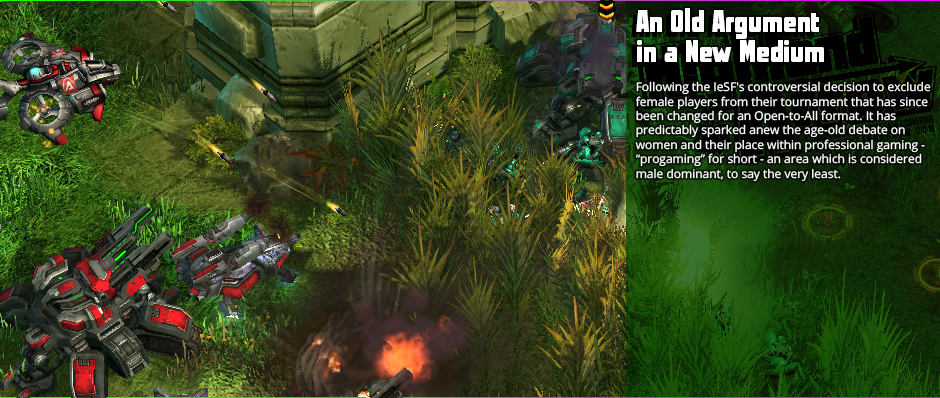Following the IeSF's controversial decision to exclude female players from their tournament that has since been changed for an Open-to-All format. It's sparked an age old debate on women and their place within an area considered male dominant.

With the current controversy that has managed to grip gaming-focused news sites and forums, an almost age old argument has once again been brought center-stage to discuss what I would have hoped would be a non-issue by now: the position of females within a largely male-dominated space. The news itself which sparked this controversy was a decision taken by the IeSF to host a male only tournament of Hearthstone, one they defended with the statement that their decision was "Made in accordance with international sports authorities, as part of our effort to promote e-sports as a legitimate sport." I'm not sure what response they envisioned when making this particular call, but there must have been some inkling when deciding to actively prevent a percentage of their competitors from taking part regardless of how many there may have been. This decision they've now rescinded in favour of two tournaments, one "open-to-all" and another "female-only" which, in my opinion, should have been in effect from the beginning.

An unfortunate side effect of this news however has been many individuals, and groups calling for the return of male-only tournaments. Some feel that female players are out of their depth, can't compete with male players, or more generally are just a simple case of sexism, believing that women don't belong in gaming at all. Another similar point of view was that women need help in promoting themselves as serious gamers. Why? Is there some reason a female player needs help with this that I'm unaware of. Is there a biological difference between the way a woman and a man's mind works that would give a female, or male an edge in a game of Starcraft 2. If a female player wants to set herself apart as a serious competitor within gaming then why does she need to jump through different hoops compared to a male player? Isn't this just legitimizing the need to treat a woman differently because she's a woman? I had certainly hoped that as a society we'd grown beyond this kind of childishness, but if this is anything to go by then there are still many people who are firm in the adage 'No girls allowed'. Which in the end, won't fix the problem, but instead continue propagating it.

Once upon a time, the gaming industry was very much a male-dominated space. Systems and video games were designed and advertised with a male demographic in mind, and still is in many cases. Percentage wise, I'm sure the male demographic outweighs the female, but there's no denying that the percentage of female gamers is steadily growing. As is the number of professional female gamers who only want to be taken as seriously in the area as a male player would be. We shouldn't be trying to snuff this out, we should be trying to encourage this: video games are meant to be entertaining, a medium where everyone is supposed to be able to have fun. Instead, however, we want to add a stipulation to this that reads "but only if you fit within these specifications" - one which isn't fair on the competitors who want to play against the best in the world and prove themselves - whether male, or female. Somewhere the future ranked #1 player could be female and actively barred from tournaments which, in turn, removes the chance for others whom are already considered the best in the world to truly test themselves. This certainly isn't fair to female players, and if nothing else is an insult to the idea that games were designed to entertain, tell stories, and some have been able to show that art doesn't necessarily have to be on a canvas, or music track. Many communities within the video game industry have become toxic, vile places that have discouraged me from playing certain games, and this kind of behaviour certainly doesn't help to change the opinion that it's an industry to be taken seriously. Is this how we want to represent ourselves to the public? An industry clinging to ideals that have long since decayed and don't even apply in the present?


